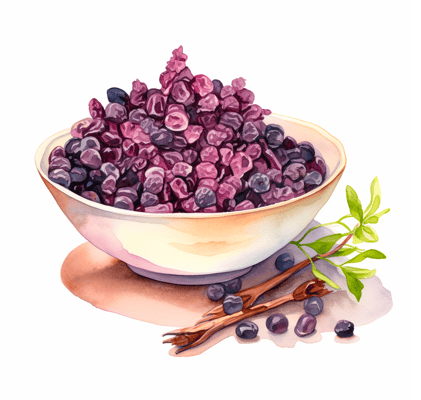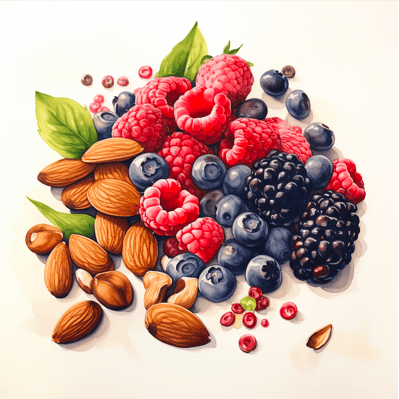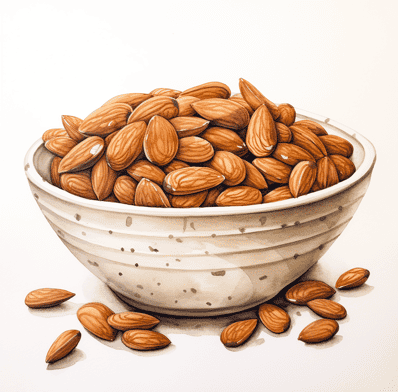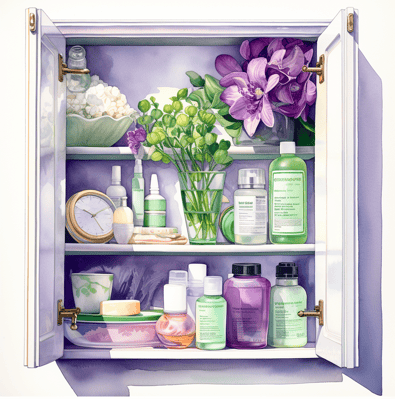
The ultimate vegan acne treatment is a diet rich in anti-inflammatory and antioxidant foods like barberries, green tea, and vitamins A and E.
We’ll also cover how to choose skincare products that don’t clash with your plant-based diet.
Hi, I’m Hazel
I gave up on skincare after years of issues with acne and sensitive skin.
But after going plant-based, my skin cleared up and even started to glow. Now I help women reveal their natural beauty with simple, delicious plant-based food.
I also used to be a nurse, and love nerding out on nutritional science (high-quality science, that is).

As usual, this post is based on the strongest nutritional evidence I could find with a focus on the simplest, most delicious foods
…because who has time to waste on actions that don’t work?
The quick version:
Vegan acne treatment involves using plant-based skincare products and consuming a diet rich in anti-inflammatory and antioxidant foods like barberries, green tea, and vitamins A and E. These natural ingredients and foods help reduce acne by controlling excess oil production, soothing inflammation, and nourishing the skin, aligning with both ethical choices and skincare needs.
The Best and Easiest Vegan Foods for Acne
Eating the right foods can nourish your body and clear skin effectively for vegan acne treatment, even for different skin types (unlike skincare products).
Here’s how:
1. Barberries: A Berry Good Acne Solution

Did you know that just a teaspoon of barberries three times a day can reduce acne by almost 50% within a month? (1). These tiny powerhouse berries are a must-try for anyone dealing with acne-prone skin.
2. Anti-Inflammatory Spices

Incorporating anti-inflammatory foods like turmeric, ginger, and sweet potatoes can soothe your sensitive skin and reduce redness and swelling (2). They’re perfect allies in your quest for clear, clean skin.
Try this:
Vegan Golden Milk Turmeric Latte at Rainbow Plant Life
(it has ginger too!)
3. Antioxidant-Rich Berries

Sticking to a diet high in antioxidants can reduce the impact of acne on your quality of life by about 30-32% and even decrease the risk of depression by 33%! (3).
Foods rich in antioxidants, such as berries, nuts, and dark chocolate, help protect your skin from damage and keep those blemishes at bay.
You may also like:
Raspberry vs Strawberry: Which Berry Is Best?
4. Simple Green Tea

Decaffeinated green tea, specifically, has shown very promising results in reducing acne.
A study with women aged 25 to 45 noted significant reductions in inflammatory lesions, especially on the forehead and cheeks, making it a soothing sip for those with blemish-prone skin (4).
Now, I’m not sure if this means that caffeinated green tea (ie. regular green tea) doesn’t work, or if the researchers simply decided to use decaffeinated tea in this experiment.
You should also read:
Matcha Magic: The Power of Green Tea for Acne-Free Skin
5. Almonds for Vitamin E

Vitamin A and E levels are often lower in people with acne (5). These vitamins are crucial for maintaining healthy skin cells and protecting against acne severity.
Foods rich in Vitamin A, like carrots and sweet potatoes, and Vitamin E, such as almonds and spinach, should be staples in your diet to help fend off those pesky pimples.
Did you know that almonds have the most Vitamin E of all the nuts? How easy is that?
For more info on almonds and acne:
Breakout or Breakthrough? Is Almond Milk Good for Acne?
Lifestyle Habits for Clear Skin
Beyond topical treatments, several lifestyle adjustments can significantly boost the efficacy of your vegan acne treatment.
Diet and Hydration
Incorporate a balanced vegan diet rich in Vitamin B and Vitamin C—essential nutrients that promote healthy skin.
Stay hydrated to help your body naturally detoxify and keep your skin clear of blemish-prone skin issues.
Stress Management and Sleep
Stress can trigger acne breakouts, so engaging in regular relaxation practices like yoga or meditation can be beneficial.
Ensure you get enough sleep, as lack of rest can worsen acne and product skin irritation.
Vegan Skincare for Acne

Opting for vegan acne treatment not only supports your cruelty-free diet but also introduces gentler alternatives for your acne blemishes. Let’s explore why these vegan solutions might just be what your blemish-prone skin needs.
Benefits of Plant-Based Ingredients
Plant-based ingredients often contain natural anti-inflammatory and antibacterial properties, which are essential for treating acne-prone skin.
Ingredients like natural fruit extract and fruit enzymes may help reduce excess sebum without harsh chemicals, promoting clearer skin.
Of course – you can always eat the fruit too!
You’ll also love:
Is Watermelon Good for Acne?
Avoiding Harsh Chemicals
Many non-vegan acne treatments use ingredients that can cause excessive drying of the skin or adverse reactions. Vegan products tend to focus on natural ingredients that are less likely to cause irritation, helping you maintain healthy skin and keeping a clear conscience about animal testing.
Top Ingredients for Fighting Acne
Incorporating the right ingredients into your skincare routine can make a significant difference in your fight against acne. Here are some top vegan ingredients known for their efficacy.
Key Ingredients to Look For
For daily use, look for products containing hyaluronic acid if you have dry skin.
If you have oilier skin look for beta hydroxy acid, and citric acid. These ingredients help in gently removing dead skin cells, controlling oil, and hydrating the skin, which is crucial for acne treatments.
Making the Most of Vegan Ingredients
Using these key ingredients in your daily routine can help manage excess oil production and keep your skin looking clear and clean. Remember, consistency is key when it comes to topical acne medication and maintaining blemish-free skin.
Building Your Vegan Skincare Regimen
Start with a gentle cleanser that contains natural ingredients to avoid product skin irritation.
Follow up with a toner that includes beta hydroxy acid to manage excess oil production, and finish with a moisturiser rich in hyaluronic acid to prevent dry skin.
Choosing the Right Products
When selecting skincare products, always check the ingredient lists for cruelty-free products.
Yes, reading a full ingredient list takes time but when you find the right choice, these products support both clear skin and a clear conscience.
You may also like:
A Vegan Guide: 25 Animal Ingredients in Cosmetics
at Shop Like You Give A Damn
DIY Vegan Acne Treatments
Sometimes, the best skincare treatments are the ones you can make at home using simple, natural ingredients.
Here are a couple of DIY remedies that can help combat acne effectively.
Simple Recipes for Clear Skin
- Tea Tree Oil Spot Treatment: Mix a few drops of tea tree oil with witch hazel and apply directly to blemishes using a cotton swab. This natural solution helps reduce inflammation and clear up acne breakouts.
- Green Tea Toner: Steep a green tea bag in hot water, let it cool, and then use it as a toner. Green tea’s antioxidants and natural fruit extracts (if you use a fruity blend) can help soothe your skin and reduce excess sebum.
Benefits of Homemade Acne Solutions
These DIY treatments offer a control over what you apply to your skin, ensuring you avoid harsh chemicals that can lead to adverse reactions. Plus, they’re cost-effective and easy to make, aligning perfectly with a plant-based diet and sensitive skin care needs.
Conclusion
Embracing the right vegan acne treatment for you about more than just finding the right products; it’s about creating a lifestyle that supports your skin health holistically. With the right foods and the right ingredients, daily routines, and lifestyle habits, you can enjoy clear, clean skin that reflects your inner health and beauty. Remember, patience and consistency are key, as is tuning in to what your body needs. Here’s to your health—inside and out!
References
Most references below will link to the original peer-reviewed study itself. However, sometimes I will link to a video over at NutritionFacts.org instead, which is by far the single best resource of brutally transparent nutritional evidence you will ever see. Dr Greger tells a great story about the realities of the science and if I think you will benefit more from one of his videos, the link will take you there instead.
Happy nerding!
- Fouladi RF. Aqueous extract of dried fruit of Berberis vulgaris L. in acne vulgaris, a clinical trial. J Diet Suppl. 2012;9(4):253-261. doi:10.3109/19390211.2012.726702
- Shivappa N, Steck SE, Hurley TG, Hussey JR, Hébert JR. Designing and developing a literature-derived, population-based dietary inflammatory index. Public Health Nutr. 2014;17(8):1689-1696. doi:10.1017/S1368980013002115
- Zujko-Kowalska K, Jankowska B, Zujko ME. The Antioxidant Power of a Diet May Improve the Quality of Life of Young Women with Acne Vulgaris. Nutrients. 2024;16(9):1270. Published 2024 Apr 25. doi:10.3390/nu16091270
- Lu PH, Hsu CH. Does supplementation with green tea extract improve acne in post-adolescent women? A randomized, double-blind, and placebo-controlled clinical trial. Complement Ther Med. 2016;25:159-163. doi:10.1016/j.ctim.2016.03.004
- El-Akawi Z, Abdel-Latif N, Abdul-Razzak K. Does the plasma level of vitamins A and E affect acne condition?. Clin Exp Dermatol. 2006;31(3):430-434. doi:10.1111/j.1365-2230.2006.02106.x
- Kodad O, Socias I Company R, Alonso JM. Genotypic and Environmental Effects on Tocopherol Content in Almond. Antioxidants (Basel). 2018;7(1):6. Published 2018 Jan 5. doi:10.3390/antiox7010006